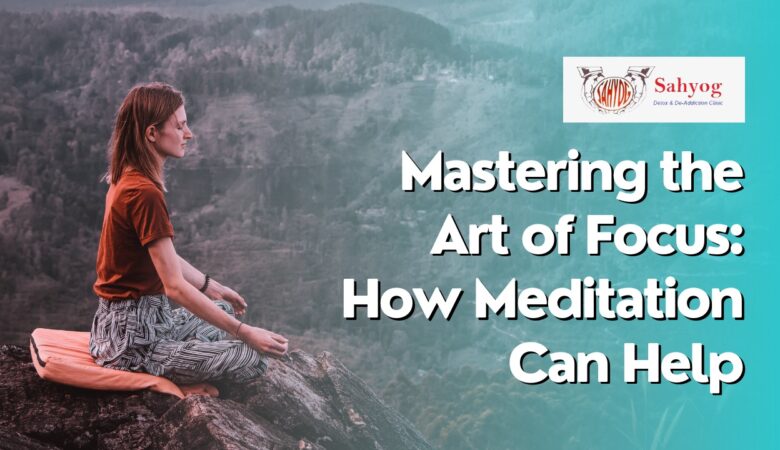Mastering the Art of Focus: How Meditation Can Help
Today’s fast-paced environment makes attention difficult. Distractions abound, from smartphone notifications to never-ending to-do lists. Successful people value our capacity to focus and concentrate. How can we learn to focus in chaos? Meditation is the key. Meditation improves concentration, productivity, and fulfillment. Meditation includes training the mind to be more alert and focused. It has been part of numerous spiritual and philosophical traditions for thousands of years, but its focus-enhancing advantages have just recently been recognized. Focus includes both shutting out distractions and directing and sustaining attention. Focusing on a task makes us more productive, creative, and capable of high-quality work. Meditation can help you reach your objectives as a student, professional, or individual. This article examines how meditation might improve attention. We will study concentration science, including cognitive processes and distractions. Meditation helps improve attention span, focus, tension, and distractions. We will also teach you how to incorporate meditation into your everyday routine to improve attention and productivity. Join us to develop attention via meditation. Learn how this ancient practice may help you face current obstacles with clarity, purpose, and inner calm. Understanding the Science Behind Focus Understanding how our brains process attention and concentration is crucial to understanding how meditation might improve focus. Focusing involves several brain areas and networks. Let’s investigate: Focus involves multiple cognitive processes Selective Attention: This lets us focus on particular stimuli and ignore others. It helps us focus and disregard distractions. Sustained Attention: The capacity to focus on a task for a long time. It requires concentration and avoiding distractions. Executive Control: Executive control activities need working memory and cognitive flexibility. These mechanisms let us switch activities, block extraneous information, and arrange our thoughts. Factors that Hinder Focus In today’s digital world, many elements might hinder focus: Digital Distractions: Emails, social media updates, and other digital distractions can disrupt concentration. Information Overload: Information overload might make it hard to focus. Stress and exhaustion: Stress and exhaustion affect cognitive performance, especially attention and focus. Meditation Improves Focus Meditation improves attention and concentration in brain networks. Here’s how: Neuroplasticity: Meditation helps the brain rearrange and develop new connections. It strengthens attention and concentrates brain networks, improving cognitive ability. Executive Functions: Meditation engages the prefrontal cortex. For prolonged concentration, this activation improves working memory, cognitive control, and decision-making. Mindfulness Training: Mindfulness meditation promotes present-moment awareness and non-judgment. This activity improves attentional control and helps refocus when distractions occur. Meditation reduces stress and anxiety, which improves attention and mental clarity. Understanding concentration science and how meditation affects the brain is the first step to using meditation to improve attention. We’ll discuss meditation’s advantages and how to incorporate it into your daily routine for maximum attention and productivity. Benefits of Meditation for Focus Meditation improves attention in several ways. Meditation improves concentration by teaching the mind to be present and attentive. Let’s examine meditation’s attention benefits: Meditation enhances attention and concentration in brain networks. It improves our focus and attention span, reducing mind-wandering. Meditation improves working memory, decision-making, and information processing. It sharpens mental clarity, helping us make better decisions even in difficult conditions. Focus boosts daily productivity and efficiency. Meditation reduces distractions and promotes flow, allowing us to focus on the subject at hand and produce better work. Meditation reduces stress and distractions. Meditation helps us focus by calming our minds. Stress reduction calms the mind, improving focus and attentiveness. Meditation helps us observe our thinking patterns and mental habits. Self-awareness helps us identify distractions, unproductive thought patterns, and focus-disrupting behaviors. Practice helps us concentrate and refocus our attention. Meditation helps us ignore external distractions. We become less receptive to sounds and distractions and can focus better despite them. Today’s digitally linked environment rewards distraction resistance. Meditation strengthens the prefrontal cortex, which regulates emotions. We may avoid emotional distractions by improving our emotional awareness and regulation. Meditation every day can uncover these advantages and improve attention. We’ll discuss focus-enhancing meditation practices in the following part, including how to start and improve your practice. Techniques for Meditating to Enhance Focus Meditation techniques especially improve concentration and attention. These meditation practices might help you master attention. Focus-boosting meditation techniques: Mindfulness Meditation: This core practice cultivates present-moment awareness and non-judgmental observation of thoughts and sensations. This method boosts attention. Mindfulness meditation for focus: Sit somewhere peaceful. Focus on your breath. Feel your breath coming and going. Focus on your breathing sensations. Gently and non-judgmentally return to your breath when your mind wanders. Practice for a predetermined time, progressively lengthening your sessions. Concentration Meditation: Concentration meditation entails focusing on one thing. This method improves focus and concentration. Concentration meditation exercises: Sit comfortably with a lighted candle at eye level. Watch the flame’s form, color, and movement. When your attention wanders, softly return to the flame. Mantra Meditation: Repeat a mantra silently or aloud. Let the mantra’s tone and energy anchor you. Refocus when distracted. Body Scan Meditation: Focusing on different body areas improves body-mind connection and focus. Body scan meditation: Sit or lie down comfortably. Close your eyes and focus on your breath to center yourself. Slowly scan your body from head to toe, noting feelings, tension, and relaxation. Observe each physical component without judgment. If you feel tightness, breathe into it and release it. Move across your body, focusing on each portion. Walking Meditation: Mindful walking promotes attention and grounding. Walking meditation: Walk in a safe, peaceful park or street. Walk naturally with an upright stance and relaxed arms. Focus on your legs, feet, and skin while you walk. Gently focus on walking if your mind wanders or distractions occur. Guided Meditation and Meditation Apps: Use guided meditation and meditation apps to improve attention. Step-by-step instructions and audio help make concentration meditation easier for beginners. Try these methods to find your favorite. Consistency matters. Start with shorter meditation sessions and progressively lengthen them. You may perfect meditation focus by including these strategies in your regimen. Establishing a Consistent Meditation Practice Meditation for focus requires regular practice. How to start


